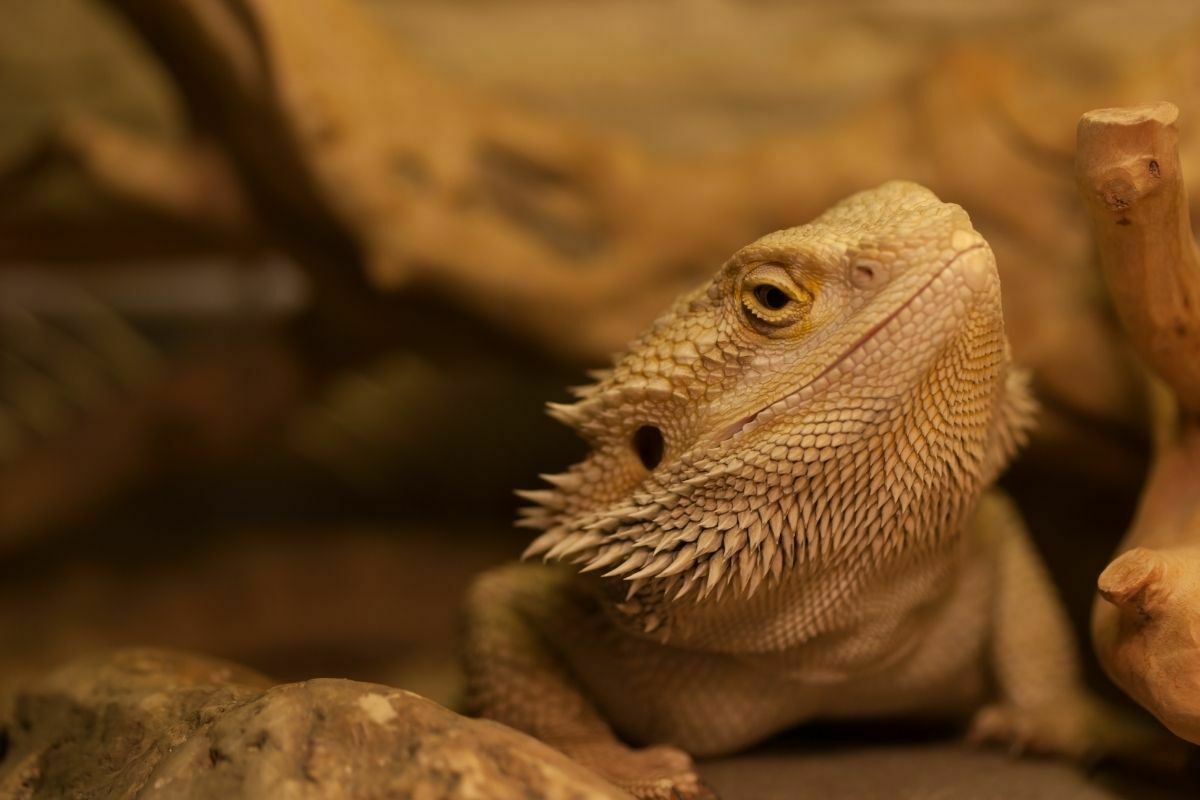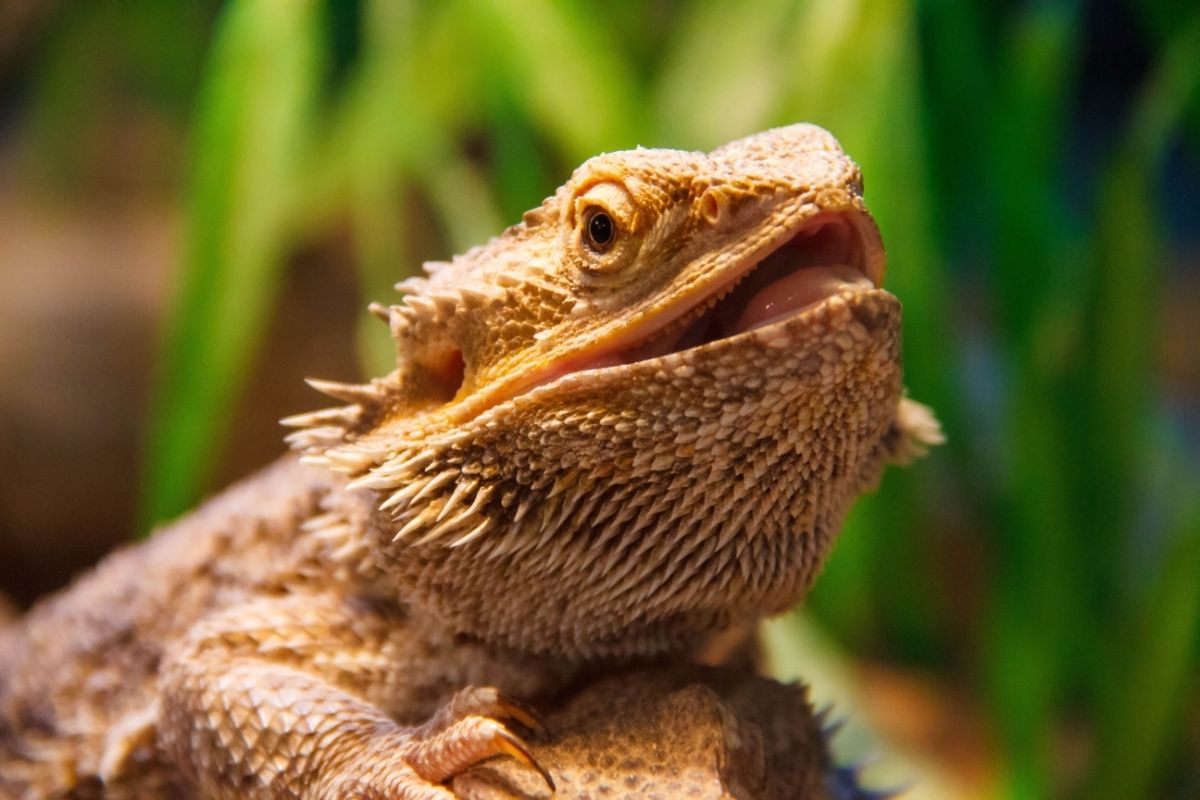Bearded dragons are one of the most popular reptiles to keep as pets.
They are a pretty low-maintenance pet (for a reptile, at least), and make a great companion for anyone interested in looking after a more exotic pet.
A bearded dragon requires specific conditions in order to stay happy and healthy.

Factors like their diet, enclosure, and even things like their size and sex are all important for contributing to their health and their lifespan.
Providing your bearded dragon with the right conditions will make sure that they live the longest life possible.
But just how long do bearded dragons live for?
If you’re interested in getting a bearded dragon as a pet, but you aren’t sure what to expect from their lifespan, then this is the article for you.
In this handy guide we will take you through everything there is to know about a bearded dragon’s lifespan, from how long they normally live for to the ways you help them have a longer life.
Ready? Then let’s get started!
How Long Does A Bearded Dragon Live For?
The average lifespan of a bearded dragon is around 8-10 years.
This means that if you buy a bearded dragon when it’s young, it should be able to enjoy a long, comfortable life.
Getting an older bearded dragon means that you will likely have less time together, but with the proper care you may be able to give them a few more years in comfort.
However, the lifespan of bearded dragons can vary wildly depending on whether they are living in captivity as a pet or if they are in the wild.
Here is a breakdown of how these two factors can have such a big impact.
The Average Lifespan Of Bearded Dragons In The Wild
Wild bearded dragons typically have a much shorter lifespan than pet beardies.
On average, a wild bearded dragon will live for between 5 and 8 years.
This is due to several different factors.
One of the main reasons for their shorter lives is the threat of predators.
Unlike pet bearded dragons, which don’t need to worry about the threat of predators, wild beardies are constantly at risk of being attacked or hunted by larger animals such as big cats or birds of prey.
Another factor is that wild bearded dragons are not provided with the same amount of food that pet beardies receive.
Wild beardies can struggle to find adequate food and water in the wild, especially in their natural habitat of desert regions in Australia.
Another reason why wild bearded dragons die younger is because of diseases and parasites.
While pet beardies are still at risk of these, it is far more likely to affect wild bearded dragons due to less control over the safety and amount of food they get.
Because there are far more risks facing beardies in the wild, their average lifespan is significantly lower than their captive counterparts.
The Average Lifespan Of Pet Bearded Dragons
Meanwhile, bearded dragons that are kept in captivity will live far longer than wild ones.
As mentioned earlier, this is because of factors including a lack of predators along with a more reliable source of food and water.
Other reasons for pet beardies living longer can be a better-regulated environment that is designed to suit their needs, as well as living in an overall less stressful and more comfortable space.
In general, most pet beardies will live anywhere from 8-12 years.
Some of the best breeds of bearded dragons are known to live even longer than this.
The longest recorded lifespan of a bearded dragon was over 18 years old!
With that said, however, not every beardie will be able to live this long a life.
In fact, a lot of pet bearded dragons can fall far from this lifespan due to a combination of the wrong environment, poor care, and shady breeders.
It’s important to do your research before you get a bearded dragon in order to avoid some common pitfalls that might cut your time together all too short.
While beardies are some of the easiest reptiles to keep, they are still much more difficult to look after than, say, a dog or a cat.
There are many factors that can affect a beardie’s life expectancy, and the proper care is crucial to ensuring they live the longest and best life possible.
What Factors Can Affect A Bearded Dragon’s Lifespan?

There are many factors that can influence how long your beardie lives for, and it’s important to make sure that your bearded dragon gets all the correct care to make sure that these factors don’t shorten its life expectancy.
These factors include:
Environment
This includes everything from the enclosure they are kept in, to the conditions you provide them.
Bearded dragons are pretty picky animals, and if they aren’t kept in the right environment it can easily stress them out – this can lead to health issues and a shorter lifespan.
A bearded dragon should be kept in a 75-gallon terrarium with absolute minimum dimensions of 48″ long, 24″ wide, and 24″ tall.
A good rule of thumb for figuring out the right size tank is to add another 10 gallons of space for every inch of your bearded dragon.
The size isn’t the only important thing, however – beardies need the conditions within the tank to be correct as well.
They need a daytime temperature of around 75℉ (24℃), a nighttime temperature of 70℉ (21℃), and a basking spot kept at around 90℉ (32℃).
The humidity should be kept between 30-40%, and they also need a good amount of light.
You should also include hiding spots and shaded areas, and make sure to clear out their waste before it builds up.
Diet
Like with any pet, a bearded dragon needs the right diet to stay healthy.
This means providing them with a high-quality protein diet, such as reptile pellets, crickets, mealworms, and roaches.
It also means making sure that your bearded dragon has access to fresh vegetables and fruit on a regular basis.
The best foods for beardies include insects, leafy greens, vegetables, and small amounts of fruit every so often.
You should aim to feed your bearded dragon a balance of these foods.
Try to feed them in these proportions: 20% insects and 80% vegetables for adult beardies, and 80% insects and 20% veggies for juveniles and adolescents.
Consult your vet if you aren’t sure what you should be feeding your beardie.
Species
Not all varieties of bearded dragons have the same lifespan, and some species can live for years longer than others.
In general, larger species will live longer than smaller ones.
One of the most common species of bearded dragons that are kept as a pet is the Pogona Vitticeps, or the Central bearded dragon.
These will typically live between 8 and 12 years in captivity.
Meanwhile, the Rankin’s dragon is a smaller and rarer species with a much shorter lifespan, and generally has a lifespan of 6 to 10 years.
Size And Sex
As mentioned before, larger species of bearded dragons will usually have a longer lifespan.
However, this is also the case for individual beardies.
If you have two bearded dragons of the same species but they are of different sizes, it’s likely that the larger one will live for longer.
This doesn’t apply to overweight beardies, however, and an overweight bearded dragon will actually have a much lower lifespan.
The sex of the beardie can also have an influence.
Most of the time, males will live for longer (although the difference is generally pretty small for pet beardies).
Males are typically larger and hardier; breeding will also take its toll on female beardies, and one that has given birth will have a shorter lifespan than a bearded dragon without any babies.
How Can I Make My Bearded Dragon Live Longer?
One of the best ways to extend your bearded dragon’s lifespan is to give it the proper care and attention that it needs.
A lot of people don’t realize how easy it is to keep a bearded dragon alive, and many of them end up dying from neglect.
For example, if you don’t provide enough heat, your bearded dragon won’t be able to regulate its body temperature properly.
As a result, it could die from overheating or hypothermia.
If you do want to increase the lifespan of your bearded dragon, there are certain things that you can do to help.
Keeping your beardie in the right conditions (as outlined by the factors above) will give them a much more comfortable and happy life.
While there is still the risk of something happening that causes your bearded dragon to die earlier, such as disease or other health conditions, giving your beardie the right environment, diet, and reducing stressful factors will make sure that it lives the longest and happiest life possible.
Final Thoughts
So now you know a bit more about how long a bearded dragon will live, the factors that can affect their lifespan, and some ways you can extend it!
A bearded dragon is one of the most interesting and fun pets you can own, but as a pet owner, it is your responsibility to make sure that they get the proper care that they need and deserve.
As long as you provide your pet beardie with everything it needs, from its enclosure to its diet, you will be able to enjoy your bearded dragon’s company for many years to come!
